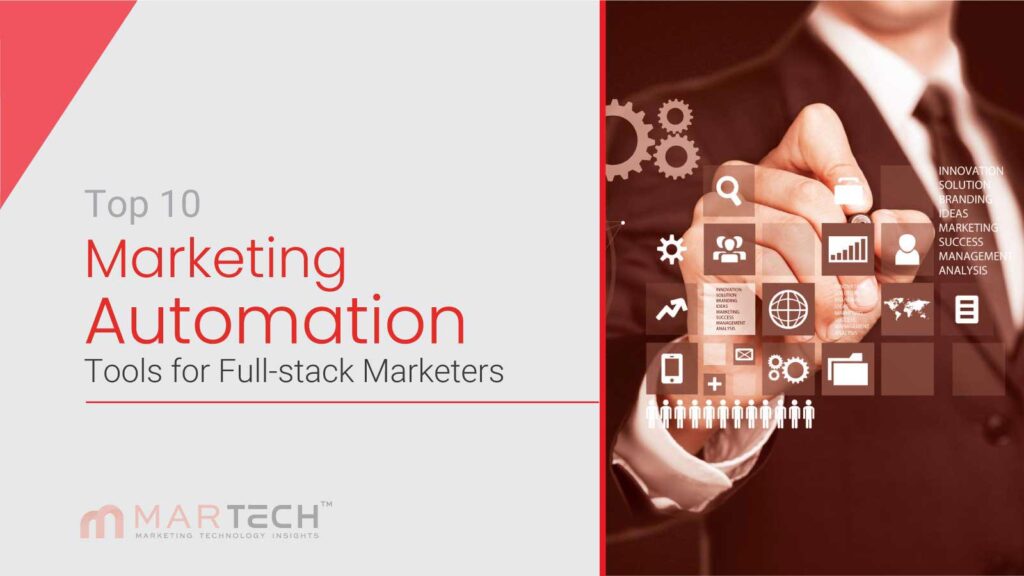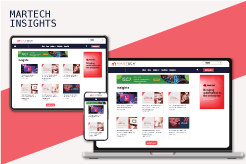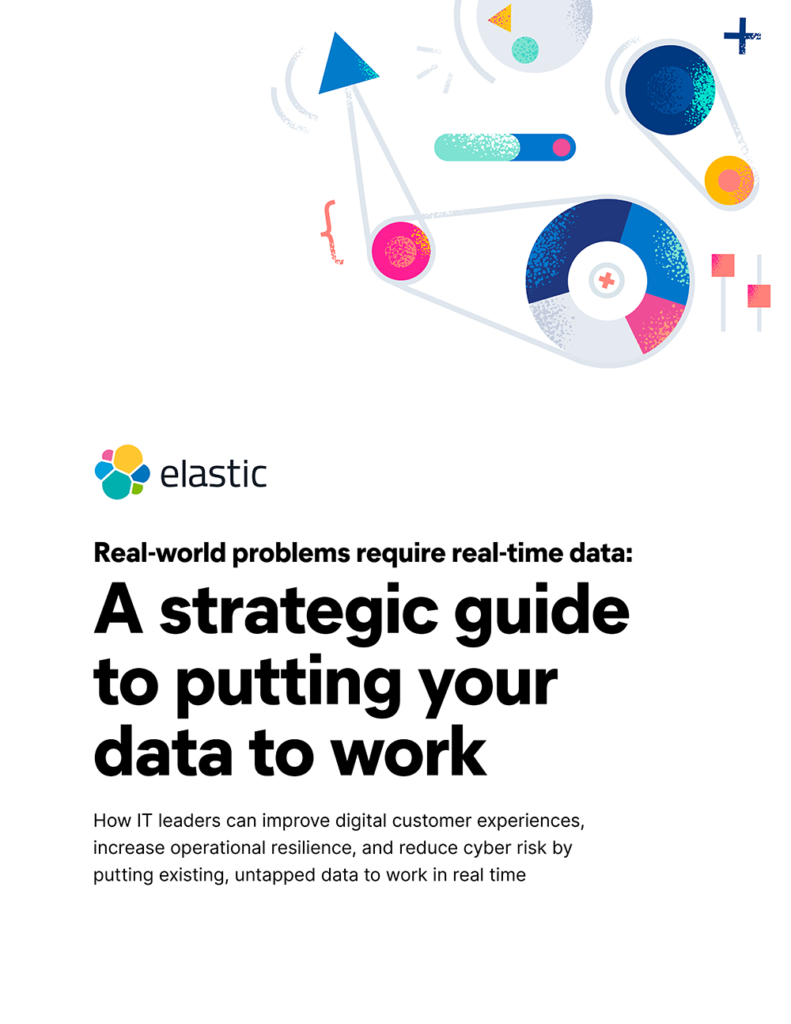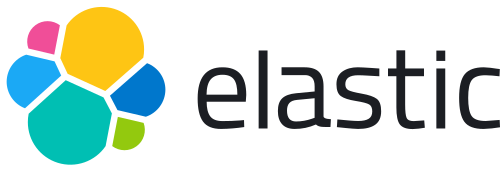Marketers can’t function without marketing automation tools in 2024. Nothing has changed in the last 10 years for marketing teams working with automation. However, despite earning the “must-have marketing technology” title among CMOs, marketing teams naturally feel overwhelmed at mentioning marketing automation tools and the problems they can solve (or, for that matter, can’t solve!). According to research, more than two-thirds of organizations use marketing automation to automate different tasks and processes. Marketing automation tools are widely used to manage email marketing campaigns, orchestrate omnichannel customer journeys, and simplify programmatic advertising campaigns to achieve better ROI. If you are a full-stack digital marketer shopping for marketing automation solutions for your business, we have you covered here. In this MarTech Intent blog, we bring you the top 10 marketing automation tools (and a few more you can review for your stack).
But, first, let’s define what’s a marketing automation tool in the modern CMO’s technology stack.
What is Marketing Automation?
Marketing automation is a software-driven scientific process of automating and streamlining one or more digital marketing processes to deliver effective, faster, and cost-friendly marketing campaigns across different channels, such as the web, mobile apps, social media, email, SMS, and connected devices. The definition of Marketing Automation covers mundane repetitive tasks as well as high-level granular insights-driven activities spanning across lead generation, audience segmentation, customer experience management, social selling, video analytics, A/B testing, content personalization, and in 2024, copilots-driven omnichannel customer communications management.
Most organizations use automation software to streamline various aspects of their digital marketing activities. To simplify your understanding of the space, full-stack marketing teams focus on these categories of marketing automation software.
- Inbound Marketing
- CRM
- Lead Management
- Marketing attribution
- Social media marketing
- Analytics and data visualization
- Email marketing
- Sales automation
- Audience segmentation
- Programmatic advertising
How does marketing automation work?
We can explain the working principle of how marketing automation works using these basic pointers:
Step 1: Data collection
Marketing automation software collects unique information about prospects and existing and former customers. The data is collected through website visits, form-fills, app downloads or in-app purchases, email clicks, social media interactions, SMS, online messaging and chats, or third-party affiliation programs.
Step 2: Personalization using content engine
Based on the data, relevant content is generated to engage the customers. The content can be personalized using a CMS or landing page builder such as WordPress, Magnolia CMS, Storyblok, Magento, or ButterCMS. Content marketing automation software enables marketers to serve personalized content, emails, and messages to customers in a frictionless environment.
Looking for the fastest way to upgrade your Martech knowledge?
Join the community of 5000+ Martech audience. Subscribe to our weekly email Marketing Technology newsletter to stay updated on the latest news, trends, research, and technology enhancements.
Step 3: Customer segmentation
Marketing automation simplifies customer segmentation in B2B and B2C marketing. Using intent data, customers are segmented based on common characteristics. Top data points to segment customers include industry, region, company size, revenue, previous sales conversations, preferences, etc. Advanced marketing automation software provides detailed customer analysis based on the highest or lowest affinity toward brands and products, average order value, time optimization, and next-best-action decision-making.
Step 4: Channel selection
Channels are your data gardens where you meet your customers during online and offline conversations. These channels are the actual data sources that feed into your marketing automation tools. While executing marketing automation campaigns, channel selection plays an important role. These channels offer a consistent media to interact with the customers and prospects. You can automate customer journeys using marketing automation software once you understand how customer data flows through these channels.
Step 5: Analytics and data visualization
Data visualization allows automation users to view how data flows through the system. This reporting is useful in planning the communication framework for marketers bringing data to life using automation. But, here’s the catch with data visualization in marketing automation.
Bad data pipelines can still show engrossing analytics and reports to marketers on the dashboard. Insufficient data audits can result in marketing campaigns falling apart. So, data quality and pipeline cleaning process is the key to succeeding with marketing automation tools in 2024.
Step 6: Testing and execution
Hooray! You are ready with your marketing automation launch sequence.
The benefit of utilizing the best marketing automation software for full-stack campaigns is its A/B testing features. You can make micro and macro adjustments to the marketing automation campaign based on data points, channels, communication mediums, customer lifecycle, and other critical pointers. If your test results fail, you can go back to the first step and reiterate the entire sequence using precise data points for specific campaigns.
Popular marketing automation tools such as Adobe Marketo Engage take the guesswork from your campaigns, helping you with high-quality lead management, cross-channel engagement, and multi-touch attribution.
Benefits of using marketing automation tools for business
Marketers expect real-data analytics from their CRMs. It directly impacts their ability to deliver a higher digital marketing ROI and maximize revenue opportunities. According to Elastic’s recent ebook, organizations that get answers from their data in real-time are:
- 8x more likely to grow revenue by 20% or more
- 1.4 times more likely to uncover more revenue streams
In the next 2 years, marketing automation budgets would increase by around 15%. Marketers use automation software solutions and tools to optimize up to 90% of their campaigns. More than 40% of automation budgets focus on optimizing lead generation management campaigns, personalization, and real-time data analytics. Another 45% of B2B marketers adopt marketing automation tools to boost lead pipelines and nurture prospects with highly engaging content and messaging campaigns across different channels. Popular tools such as Salesforce Marketing Automation software unify customer data with Artificial Intelligence (AI) to drive revenue with real-time integrations across the Sales, Marketing, and Customer Success teams.
MarTech Intent newsdesk identified these benefits of using marketing automation software for full-stack campaigns:
#1 Saves time
Nothing out of the box here! Saves time; will win. Nearly half of B2B marketers familiar with the concept of marketing automation say they have saved time by automating repetitive tasks in their CRMs and customer communication operations. Time-saving goals are the biggest benefit of marketing automation tools in B2B organizations.
#2 ROI-centric
Marketers spend $30 to acquire new customers in 2024, more than 3x of what they spent on customer acquisition in 2015. All the data that goes into automation has to justify the outcomes. Marketing automation delivers a high ROI to users. According to research, the average marketing automation ROI is between $5 and $5.5 per dollar spent in digital marketing campaigns. Fastest growing digital marketing teams center their efforts toward generating ROI-centric results— chances are higher of meeting the targets with the best marketing automation software in your martech stack.
#3 Full automation accelerates campaign delivery
Marketers can deliver up to 5x more campaigns to audiences, enabling faster conversions from leads to prospects to customers to loyal advocates. Automation streamlines communication channels by delivering personalized messages and content to the right person at the right time and place. To be exact, automation targets and nurtures audiences with higher chances of conversion.
So, if you use marketing automation software for email marketing and social media marketing, you can accelerate the speed of delivering campaigns to targeted audiences. All you have to do is segment your contact lists saved in updated databases using CRM, data analytics, and AI — a powerful feature developed by Salesforce Marketing Cloud.
Let’s look at the best marketing automation software solutions of 2024. Here’s our pick:
Keap
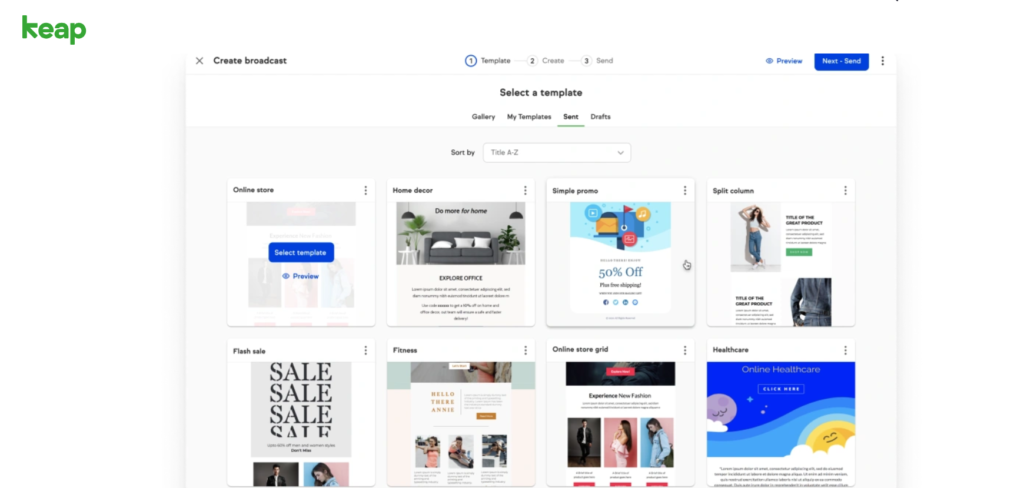
Limited budgets and poor skills prevent small businesses from tapping into the CRMs and marketing automation tools.
Most small-sized businesses operate with a siloed mentality. This creates friction between the sales and marketing engines. Keap is an effective marketing automation software solution to prevent friction points between marketing and sales teams. It has a wide variety of functions in CRM, email and text messaging, automation, lead capture and pipeline management, and integrations with other martech tools. Keap is renowned for its attractive pricing slabs — Ignite, Grow, and Scale. For startups, Keap marketing technology fits the bill with Lifecycle Automation, which essentially empowers smaller marketing teams with handy CRM-Business automation software for lead management, email automation, texting, and tons of other marketing campaigns.
From an ROI perspective, starting with Keap is a good choice in 2024.
HCL Unica
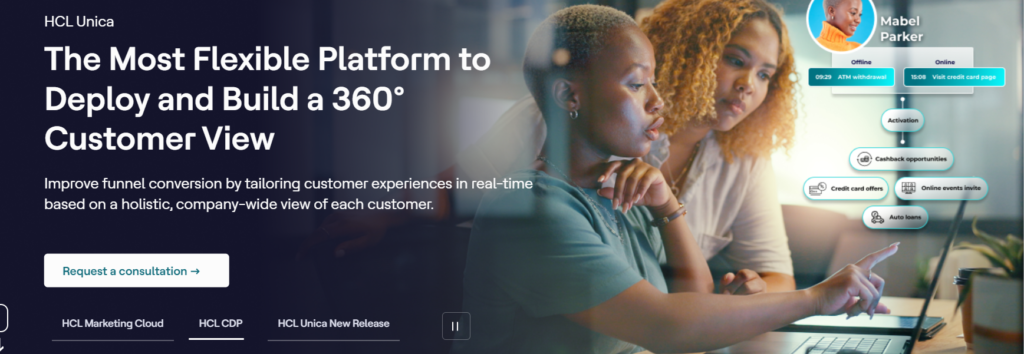
HCL Unica is a goal-based marketing automation platform for journey orchestration and precision targeting. It is offered as part of the HCL Marketing Cloud.
Global brands from different industries such as banking and finance, healthcare, insurance, telecom, media, retail, and CPGs use HCL Unica to automate the entire multichannel marketing campaigns. Its cloud-native deployment requires minimum IT involvement, which means marketers can start integrating their omnichannel marketing campaigns on the go.
MarTech Intent team will continue to review HCL Unica and UCL CDP in the coming weeks to gather more information for the Martech users.
If you have an immediate requirement for an end-to-end marketing solution for automation, let us know.
We can connect you to our ABM experts to help you re-engineer your martech stacks for lead generation and inbound marketing.
Adobe Marketo Engage
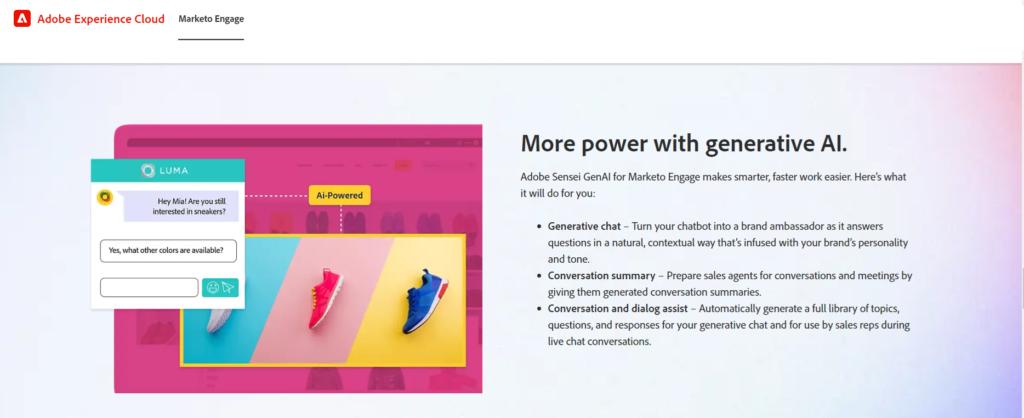
Are you looking to sync your CDP, Marketing CRM, and Sales intelligence tools? Adobe Marketo Engage does it all for you automatically. That’s why it made it to the list of MarTech Intent’s top 10 marketing automation software tools of 2024.
Martech Intent News: Top GenAI Online Shopping Trends in 2024
Adobe Marketo Engage is a one-stop Account-based marketing solution for full-stack digital marketing teams. Its AI-led marketing automation empowers marketers to align sales and marketing efforts across all channels. Email marketing teams, in particular, will benefit the most from this top-ranking marketing automation software in 2024. Reason? Marketo Engage offers GenAI email authoring capabilities to drive more customer engagement and conversions with new in-product dashboards. The embedded meeting scheduler turns landing pages into booked meetings faster, resulting in concerted customer-triggered events-based conversations across all channels. If you are looking for a cross-channel marketing solution with lead management and ABM capabilities, Marketo Engage is a suitable Martech ingredient for 2024 stacks.
Additional product features include:
Dynamic Chat: Demand generation teams use this Marketo tool for faster and more accurate lead generation, conversion, and sales acceleration with AI-powered chats.
Marketo Measure (previously Bizible): Acquired by Marketo in 2018 (before Marketo was acquired by Adobe) Bizible recently received a new name. It’s now called the Marketo Measure.
For old-school Martech followers, we know Bizible as the go-to multi-touch marketing attribution solution for high-growth B2B teams. Its pre-built attribution dashboards provide abundant insights for lead intelligence, marketing automation, media attribution, and timeline optimization. Today, B2B marketing teams use Marketo Measure to gain attribution data harnessed from the Adobe Experience Cloud platform.
HubSpot Marketing Automation
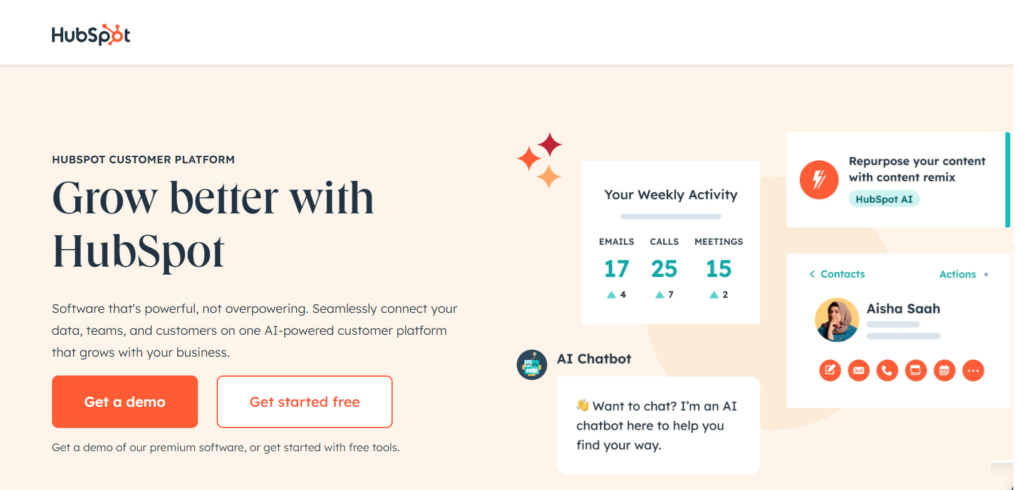
HubSpot is the “Peter Quill” in our Marketing Automation landscape. It does a bit of everything and emerges as a winner in complex drip campaign scenarios where other automation fails miserably. If you have a new B2B marketing team with little or zero knowledge of how to use marketing automation tools for campaigns, HubSpot is your savior.
What started as an inbound marketing software for content and email has now evolved into a sophisticated full-stack marketing and sales automation deck that practically puts any business on a fast growth curve.
One of the first marketing automation tools to integrate GenAI features in its co-pilot journeys, HubSpot marketing automation software boosts campaign efficiency with advanced marketing analytics.
Salesforce Marketing Cloud
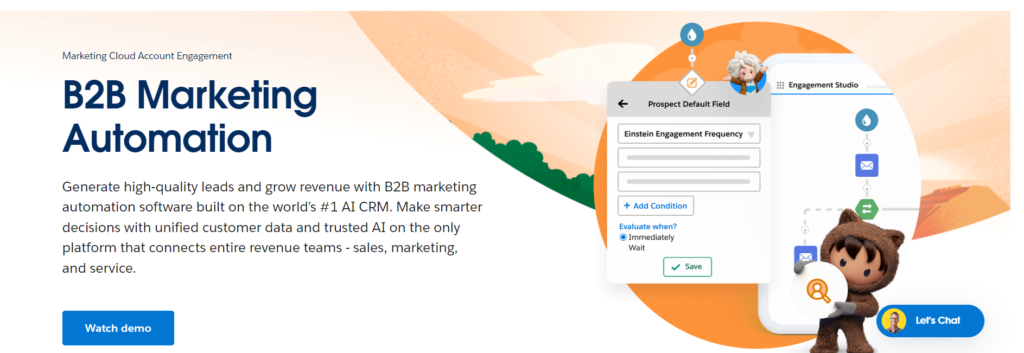
Finding it difficult to implement Artificial Intelligence into your current digital marketing and ABM campaigns? Salesforce marketing automation is the preferred solution to drive AI-powered cohesive customer journeys.
Salesforce Marketing Cloud is a leading full-stack digital marketing analytics and engagement solutions provider. It is an all-in-one cloud destination for CRM, CDP, marketing reporting and analytics, B2B marketing automation, marketing AI, and personalization. Built on a powerful CRM, the Salesforce marketing automation solution has an intuitive lead generation feature for building personalized cross-channel journeys using AI. Its full-funnel marketing attribution for multi-touch campaigns extends the power of email marketing, mobile engagement, and advertising.
Zoho
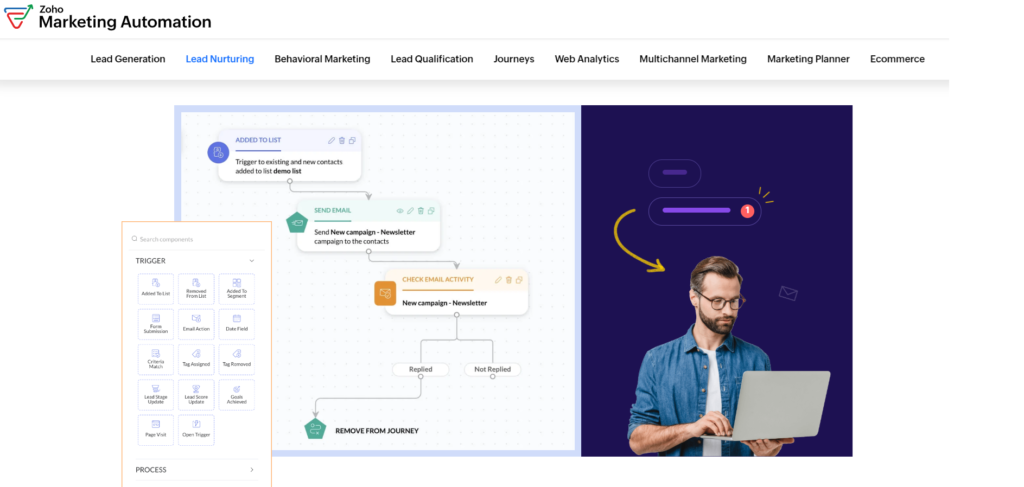
Are you looking to build a Superman out of your digital marketing stacks? Go for Zoho!
Zoho marketing automation software ‘humanizes” the entire customer journey with tailor-made solutions for lead generation, behavioral marketing, web analytics, and much more, with seamless integrations. Zoho users find deeper connections with their leads at every stage of acquisition, nurture, qualification, and conversion. Marketers can integrate high-traffic intent traffic to websites or apps based on highly personalized drip campaigns reaching relevant leads from your targeted audience base.
One way Zoho scores more points over others in the list is its ability to tap into the CRM database and send out bulk emails, WhatsApp messages, SMS, and in-app push notifications. Zoho also provides abundant options in marketing automation with its integrations with top-tier applications such as Vonage, Twilio, Google, MessageBird, SugarCRM, Wistia, and others.
MessageBird
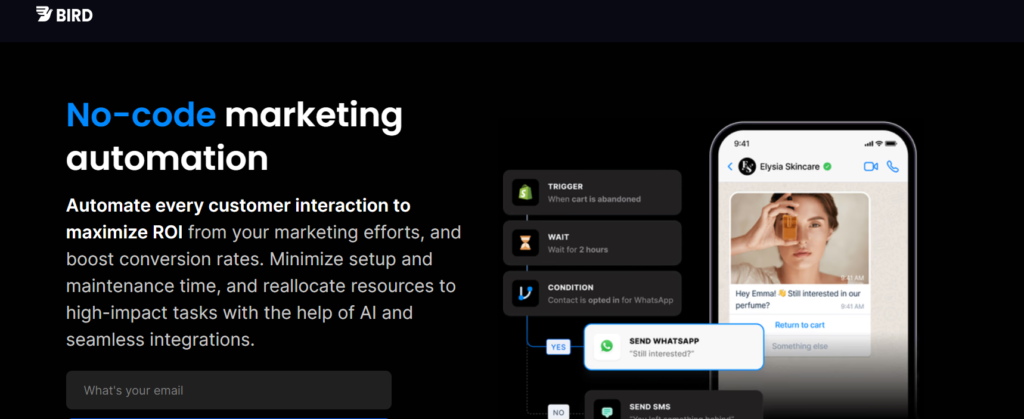
Marketers barely have any coding skills. If you want to focus only on marketing campaigns and avoid coding for designs and executions, then no-code automation platforms are your best options. Messagebird makes it to our list as a no-code marketing automation for omnichannel campaigns. What kind of wins do MessageBird customers report to the industry?
Customers gained 2.5x higher conversions, resulting in a 150% increase in revenue cross-channel engagement campaigns. Apart from personalizing at scale using no-code automation tools, MessageBird reduces overall marketing costs by integrating the marketing cloud with multiple SaaS solutions for workflows and customer journeys.
Pipedrive
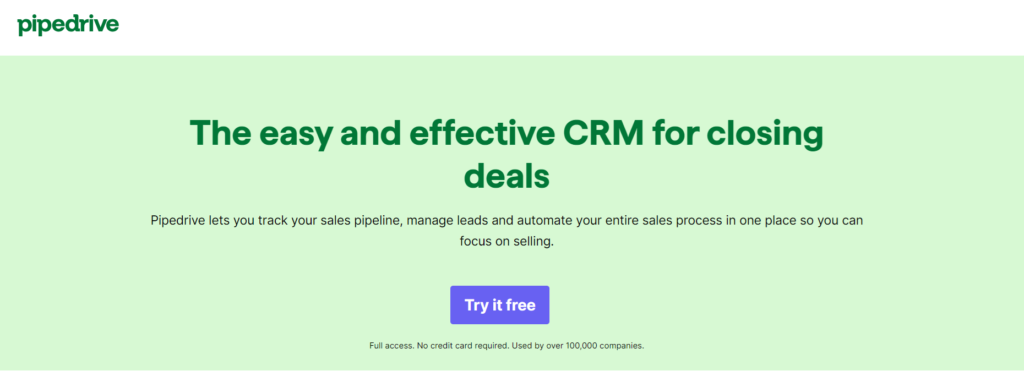
Campaigns by Pipedrive is a useful email marketing automation for lead nurturing. The email marketing automation solution connects every B2B lead generation and nurturing activity with innovative lead nurture campaigns. So, new leads are contacted with personalized marketing emails that convert into deals. Pipedrive Email Campaigns’ analytics tools track KPIs related to engagement, bounce rates, unsubscribed lists, and automated contact data management. This automation workflow helps to build better campaigns with no-code templates and a drag-and-drop editor.
One of the strongest reasons to buy Pipedrive marketing automation software is its commitment to CRM data privacy and security, meeting the GDPR and CCPA requirements.
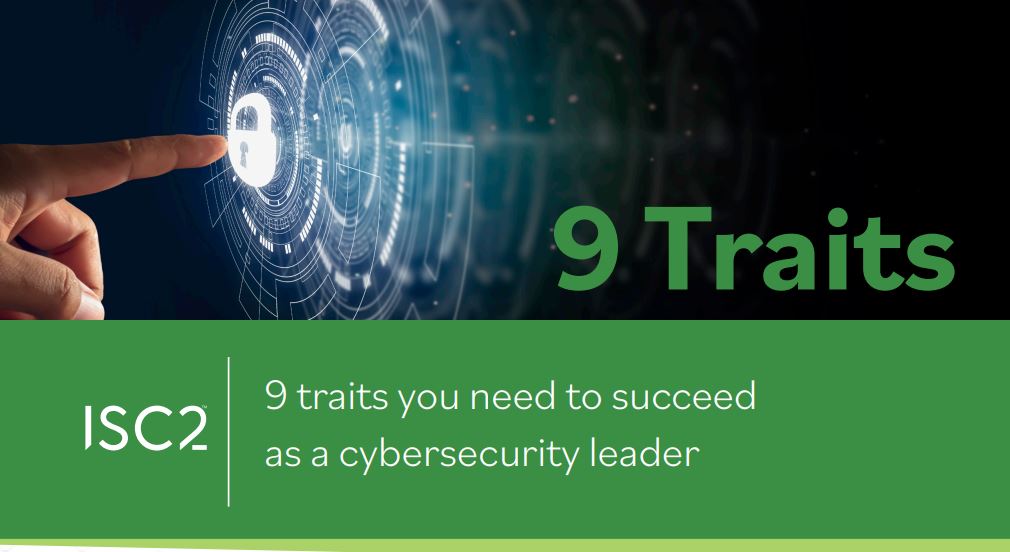
Oracle Eloqua Marketing Automation
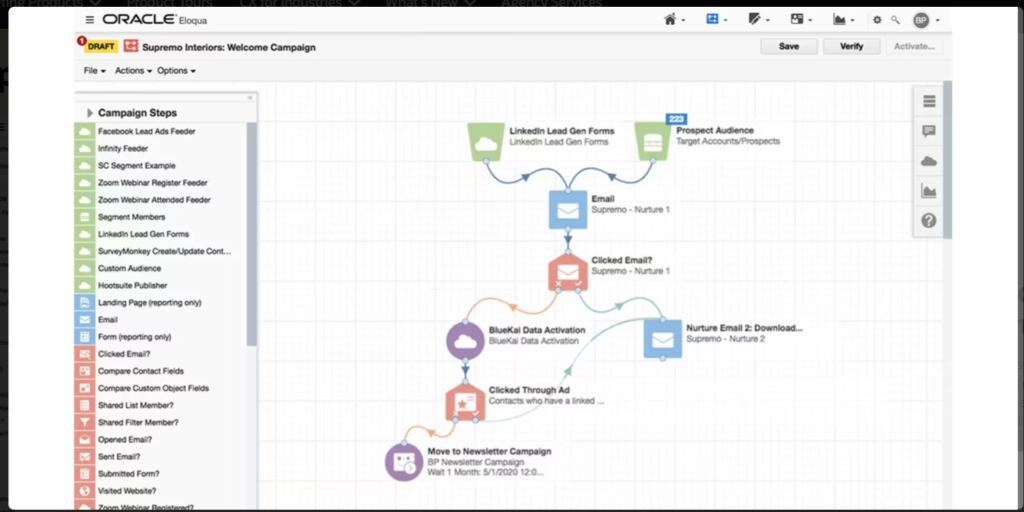
Oracle Eloqua is a leader in the multichannel marketing automation management and ABM segments. Eloqua marketing automation software is part of the broader martech suite, the Oracle Advertising and Customer Experience Cloud.
B2B marketing teams rely on Eloqua’s campaign orchestration for multistep marketing automation. Insights-driven lead management empowers marketers to respond to unpredictable customer journeys using expanded engagement analytics for different campaigns. B2B marketers use Eloqua marketing automation software to improve alignment with sales reps, providing a unified buyer and account intelligence across the sales cycle. It provides integrations with Sales CRM such as Salesforce and Oracle Sales, ensuring better conversions for your B2B leads.
Dutch health technology Philips uses Eloqua marketing automation for digitally transforming lead generation and lead capturing campaigns. Overall, customer centricity remains the biggest win-factor for Eloqua customers while using marketing automation tools for their B2B campaigns.
Act-On
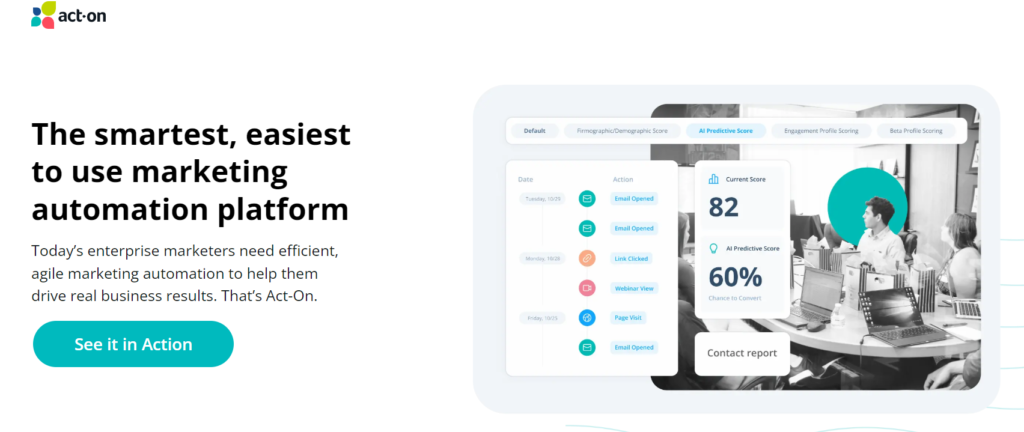
Act-On is a multi-channel marketing automation software for high-quality lead scoring and segmentation campaigns. B2B marketers use Act-On to boost engagements with highly personalized omnichannel campaigns served through Emails, CRMs, web forms, social media listening tools, and instant messaging solutions for SMS and WhatsApp. Social media automation drives more value to B2B lead generation campaigns, assisting customers with superior purchasing decisions using intuitive single-touch platforms.
Martech integrations with Act-On include Salesforce, Zapier, Zoom, Oracle NetSuite, Zendesk Sell, Microsoft Dynamics365, and SugarCRM.
More options…
Are you unimpressed by our choice of Martech solutions for your full-stack automation? We got you.
Here’s the list of alternatives that you can use to automate your marketing campaigns.
- Constant Contact: For email and SMS marketing automation
- Freshmarketer, by Freshworks: For AI-powered full-stack marketing automation
- Mailchimp: For email marketing automation
- ActiveCampaign: For omnichannel marketing automation, including bespoke martech integrations and AI features
- Hootsuite: For social media marketing automation and analytics
- Moosend: For email marketing automation
- Acquia: For automated campaign management
- AdRoll: For omnichannel marketing automation with retargeting capabilities
- Brevo (formerly Sendinblue): For email marketing automation campaigns with conversation intelligence tracked from emails, SMS, and WhatsApp
- Sage CRM: For customizable automated lead aggregation and de-duplication
And, the conversation continues
Digital marketers! The full-stack marketing automation tools will continue to make lives easy for everyone. While large CRM makers with dedicated services hosted on their marketing and experience clouds remain the go-to choices for CMOs with budgets, it’s the smaller automation software providers that you should keep in your buying window. Apart from the traditional Martech integration and disparate data silo challenges that prevent marketing teams from generating the full ROI from their marketing automation tools, it’s the new-age issues related to data security and privacy that present the biggest questions to the CMOs.
To send us your product news and updates, please fill this form here or click the button below.


